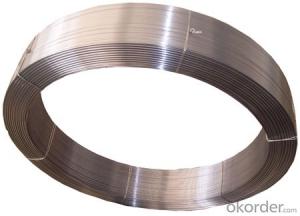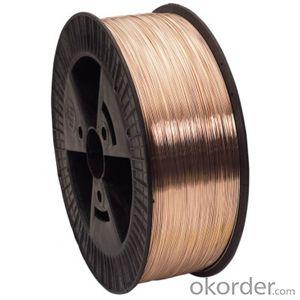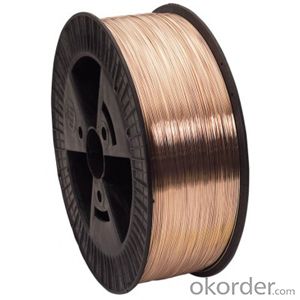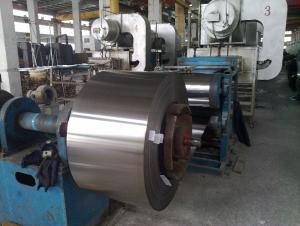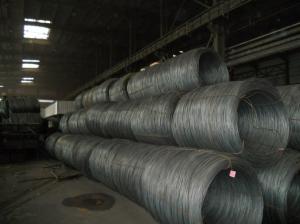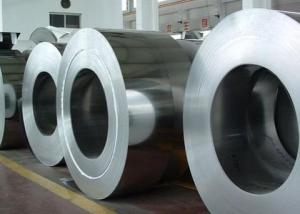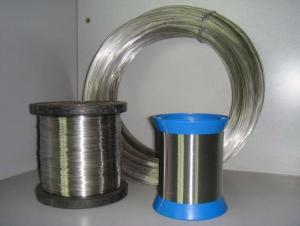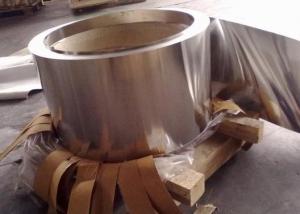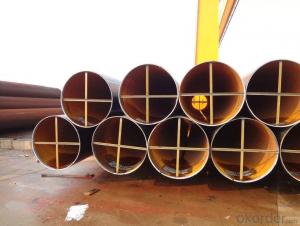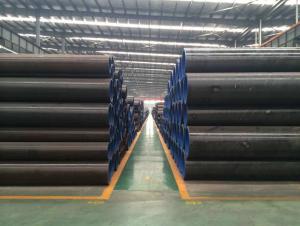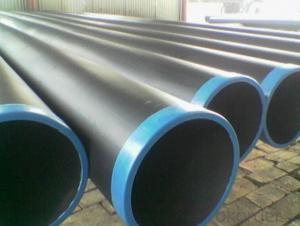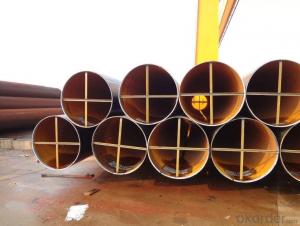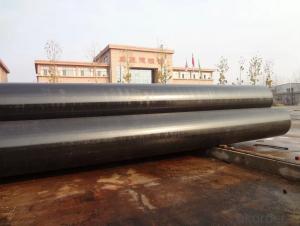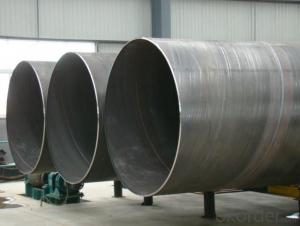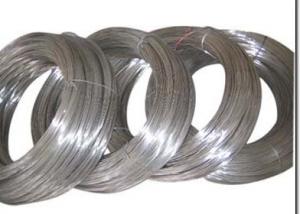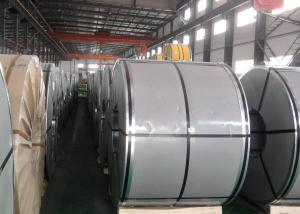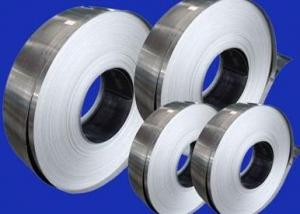Submerged Arc steel Welding Wires EM12K
- Loading Port:
- Qingdao
- Payment Terms:
- TT OR LC
- Min Order Qty:
- 10 m.t.
- Supply Capability:
- 1000 m.t./month
OKorder Service Pledge
OKorder Financial Service
You Might Also Like
Specifications
The submerged arc welding wire series products feature excellent welding and mechanical performances.
Submerged Arc Welding Wire
The products easily removable residue, good seam forming and highly efficient deposiyion.Wire meltingdoes not lead to splash or strong flasing.The sem surface is smooth and welding quality is guaranteed. They facilitate mechanical and automatic welding process. With a wide range of welding parameters, the wires can be used in open fields with strong wind and applied to automobiles, ships, bridges and chemical engineering.
Main Applications:
Applicable to welding of low-carbon steel and some low-alloy steel(such as 16Mn); automatic
submerged arc welding of boilers, pressure vessels, etc.
Chemical compositions of one sample wire(%)
C 0.06 Mn 0.94 Si 0.024 Cr 0.025 Ni 0.015 Cu 0.130 S 0.014 P 0.017
Mechanical Properties of one sample deposited metal
Yield Strength(Mpa) 469
Tensile Stregth(Mpa) 578
Elongation(%) 28
Impact Energy(-20°c) (J) 87
- Q: What are the different types of stainless steel wire coatings?
- Stainless steel wire can be enhanced in performance and durability through various coatings. Some commonly used coatings for stainless steel wire include the following: 1. PVC Coating: To provide exceptional corrosion resistance and electrical insulation, polyvinyl chloride (PVC) coating is a favored option. This coating is typically applied by immersing the wire into a heated PVC solution, allowing it to cool and harden. 2. Nylon Coating: Another popular choice for stainless steel wire is nylon coating, which offers good abrasion resistance and durability. The wire is dipped into a molten nylon solution and then cooled and solidified. 3. Polyethylene Coating: For excellent protection against corrosion and abrasion, polyethylene coating is frequently employed. It is commonly used in applications where the wire is exposed to harsh environments or chemicals. The coating is applied by either extrusion or hot-dipping the wire into a molten polyethylene solution. 4. Epoxy Coating: In applications requiring high chemical resistance, epoxy coating is a preferred option. It provides a smooth, hard, and durable finish that can withstand harsh conditions. The wire is typically dipped into an epoxy resin solution and then cured at high temperatures. 5. PTFE Coating: Known as Teflon coating, polytetrafluoroethylene (PTFE) coating offers excellent nonstick properties and resistance to chemicals and high temperatures. It is commonly used when the wire needs to slide or move freely. The coating is applied by spraying or electrostatically applying a PTFE powder onto the wire, followed by baking to form a smooth and durable finish. These examples represent just a few of the available coating options for stainless steel wire. The selection of a coating depends on specific application requirements, such as corrosion resistance, electrical insulation, or chemical resistance.
- Q: Can stainless steel wire be used for springs in the jewelry industry?
- Yes, stainless steel wire can be used for springs in the jewelry industry. Stainless steel is a popular choice for jewelry making due to its durability, corrosion resistance, and aesthetic appeal. It is commonly used for various components, including springs, clasps, and findings. Stainless steel springs provide strength and flexibility, making them suitable for different types of jewelry, such as bracelets, necklaces, and earrings. Additionally, stainless steel wire can be easily shaped and manipulated to create intricate designs, making it a versatile material for jewelry springs.
- Q: What are the different wire diameters available for stainless steel wire?
- The different wire diameters available for stainless steel wire vary depending on the specific application and industry requirements. They can range from as small as 0.001 inches (0.0254 mm) to as large as 0.500 inches (12.7 mm) or more. The selection of wire diameter is based on factors such as strength, flexibility, conductivity, and the intended use of the wire.
- Q: Is stainless steel wire suitable for wire rope fences?
- Indeed, wire rope fences can be made using stainless steel wire, which is a fitting choice. Stainless steel, known for its exceptional durability and resistance against corrosion, is perfectly suited for outdoor applications like fences. It possesses the remarkable ability to endure even the harshest weather conditions, including rain, snow, and the damaging effects of UV rays, without succumbing to rust or corrosion. Moreover, stainless steel wire boasts high tensile strength, granting the fence the ability to withstand tension and pressure. As a result, it proves to be a dependable and enduring option for wire rope fences, ensuring both security and stability in a wide range of settings, be it residential, commercial, or industrial.
- Q: Can stainless steel wire be used for netting?
- Certainly, netting can indeed utilize stainless steel wire. Stainless steel wire possesses exceptional durability, resistance against corrosion, and resilience in the face of harsh environmental conditions. These characteristics render it a material ideally suited for netting purposes. Across industries encompassing agriculture, fisheries, construction, and sports, stainless steel wire finds extensive employment in fabricating netting structures that serve functions such as containment, protection, safety, and separation. With its remarkable strength, flexibility, and longevity, stainless steel wire netting proves itself adaptable to a wide array of applications, including fencing, animal enclosures, bird control, pest exclusion, and even decorative endeavors.
- Q: What are the different types of stainless steel wire rope coatings available?
- There are several types of coatings available for stainless steel wire ropes, including galvanized, nylon, PVC, and polyurethane. These coatings provide varying levels of protection against corrosion, abrasion, and environmental factors.
- Q: How to use the soldering welding of stainless steel wire
- TIG DC TIG, DC polarity welding (ground - cathode, welding torch is connected with the negative pole +).MAG welding active gas + inert gas mixed gas shielded arc welding.
- Q: Is stainless steel wire suitable for outdoor signage?
- Yes, stainless steel wire is suitable for outdoor signage. It is highly resistant to corrosion, weather conditions, and UV rays, making it a durable and long-lasting option for outdoor use. Additionally, stainless steel wire provides a sleek and professional appearance, making it an ideal choice for signage in various outdoor settings.
- Q: What are the different wire mesh options available in stainless steel wire?
- There are several different wire mesh options available in stainless steel wire, including plain weave, twill weave, Dutch weave, and welded mesh.
- Q: Can stainless steel wire be used for tie wire applications?
- Stainless steel wire is indeed suitable for tie wire applications. Renowned for its exceptional resistance to corrosion, durability, and strength, stainless steel proves to be an outstanding option for such purposes. Its utilization is widespread in construction, landscaping, and various other industries that necessitate the use of a resilient and enduring tie wire. The rust-resistant nature of stainless steel tie wire empowers it to withstand even the harshest environmental conditions, guaranteeing its reliability and durability. Moreover, the availability of stainless steel wire in diverse sizes and gauges grants the flexibility and customization required to meet specific tie wire needs.
Send your message to us
Submerged Arc steel Welding Wires EM12K
- Loading Port:
- Qingdao
- Payment Terms:
- TT OR LC
- Min Order Qty:
- 10 m.t.
- Supply Capability:
- 1000 m.t./month
OKorder Service Pledge
OKorder Financial Service
Similar products
Hot products
Hot Searches
Related keywords
